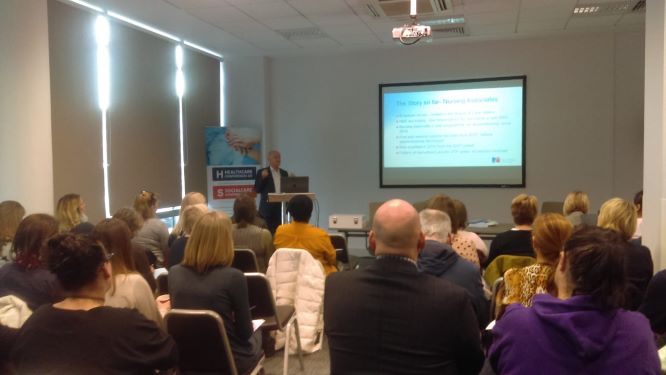The Nursing Associate Role National Update: The role and where it came from
Gary Kirwan, National Officer and Team Leader, Independent and Wider Public Sector, The Royal College of Nursing
Gary Kirwan joined the RCN in January 2003. He has been a member of the NHS Job  Evaluation Group and the NHS Knowledge and Skills Framework Group between 2003- 2009. Prior to working at the RCN, he worked as a senior officer at the Chartered Society of Physiotherapy.
Evaluation Group and the NHS Knowledge and Skills Framework Group between 2003- 2009. Prior to working at the RCN, he worked as a senior officer at the Chartered Society of Physiotherapy.
He currently leads a team within the Employment Relations department responsible for all national employers outside of the NHS in the public sector and Independent health care sectors. He currently sits on the NHS Staff Council Apprenticeship pay sub group representing the RCN. Within the RCN he has led on the introduction of Nurse Associates and Nurse Apprenticeships into the workforce.
"The role [of the Nursing Associate] is, unusually, an England only role – there is a wait-and-see approach being taken by Wales, Scotland and Ireland, to see how the role evolves… it is an in demand role, and it has grown very quickly. Eight years ago it wasn’t heard of, but the government has pushed this needed role forward… It is a quite revolutionary programme to be in the work force, making such a significant difference so quickly. Usually health[care] works slowly, Nursing Associates is the exception… For every Nursing Associate in the room, 40 people would have applied for that role" Gary Kirwan
The Nursing Associate Role: Regulation and Standards
Sue West, Senior Nursing Education Adviser, Nursing Midwifery Council
Sue qualified as a registered nurse in 1982, and recently joined the Nursing and Midwifery Council as Senior Nursing Education Adviser contributing to the ongoing development and implementation of the education and practice standards. Sue spent her early clinical career in cardiothoracic nursing and critical care, before joining Buckinghamshire New University in 1994, where she progressed in her career to the role as Dean of the Faculty of Society & Health at the University. Sue has held a number of academic roles including principal lecturer in critical care before becoming head of the department and then academic dean. She pioneered the development of an inter-professional continuing personal and professional development framework to support the drive for a qualified workforce in healthcare.
Sue has promoted the integrated care agenda through the development of innovative placement pathways to increase placement capacity across North West London. Sue has also worked closely with the Council of Deans for Health to influence the changing health education landscape. Sue has also been influential in a number of external fora relating to nurse education as Chair of the Education Expert Reference Group for Health Education Thames Valley and the Health Education Group (London Higher) which represents universities within the region.
"One of the big changes in our new [NMC] standards for Nursing Associates is that they are outcome focused not process driven. We’re not telling you how to do it, we’re telling you what you need to do in order for students to meet standards. It enables innovative ways of working and thinking, that enables students to learn in the way that they are able to" Sue West
Medicines Management and the Nursing Associate
Prof Angela Alexander MBE, Professor Emerita, School of Pharmacy, University of Reading. Chair, Working Party, The competency framework for prescribing supervisors and assessors/designated prescribing practitioners (DPP)
Pre-event abstract
This session will consider the role of the Nursing Associate in medicines management and the education and training required to ensure a safe practitioner. The ongoing governance and assurance will also be discussed. Three key documents which inform this process will be considered. There will be some examples of how Trusts are responding to this role and audience participation will be encouraged to share ideas and examples of best practice.
"[Medicine Management for Nursing Associates] is not robotic, it’s personal to patients. In training you need to demonstrate this… You have to look at the patients’ perspective of what a whole holistic care package is" Angela Alexander MBE
My role as a Trainee Nursing Associate
Jenny Hiorns, Registered Nursing Associate
My advice to anyone starting out as a trainee is to use your resources. Some trusts have clinical educators and they can be so useful when communicating with ward areas and educating members of staff about who and what we are. I created a file containing lots of press releases, the standards for NA’s from the NMC and left this for staff to look at on the nursing station, this has cut down a lot of people’s worries around the role. I do know some of my colleagues created a board on their wards with lots of information about our role, this seemed to help in certain working areas.
“If you put the effort in, try hard and with determination you will reap the reward you deserve and succeed to be the best you can be”
